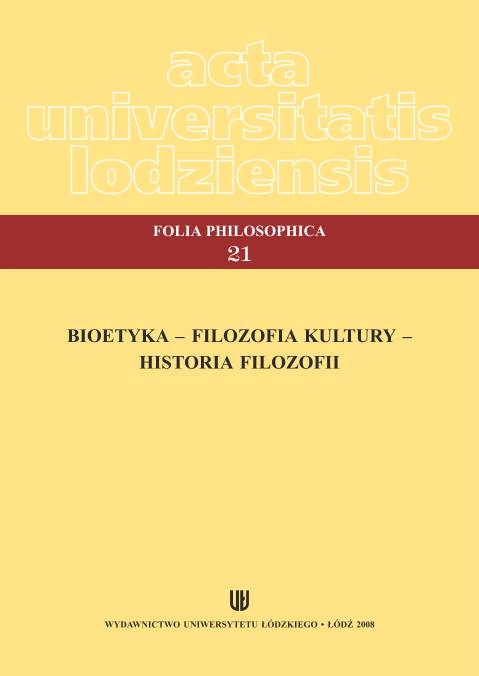Wpływ Kartezjusza na filozofię Locke'a. Problem intuicji
DOI:
https://doi.org/10.18778/0208-6107.21.11Abstrakt
There is no doubt as to influence of Descartes on Locke's philosophy. First of all it is a fact of Locke's biografy: issue of intuition appears in Locke's writing after his visiting France in 1675-1679, where probably he had known Descartes' manuscript of "Regulae ad directionem ingenii". Maybe that conception of intuition drew Locke's attention to the issue. There was no mention of intuition in early Draft A (written in 1671). The article shows the resemblance of notion of intuition in Descartes' and Locke's philosophy. Descartes claim that intuition is a distinguished state of mind. This state has pure intellectual character. It has nothing to do with divine illumination. It is one straight, directly mental action. For Locke the intuition is the perception of the certain agreement or disagreement of two ideas immediately compared together. Both thinkers compare intuition to the light. But Descartes distinguishes that state of mind and for Locke it is just one of many human faculties. Descartes and Locke consider that intuition is certain beyond all doubt, needs no probation, and this is the highest of all human certainty. Even where Locke seems to have taken over the idea of intuition of Descartes, it will be found that he has imposed his own interpretation upon it.
Bibliografia
[Aaron] R. I. Aaron, John Locke, Oxford 1965.
Google Scholar
[Adam, Tannery] C. Adam, P. Tannery, Oeuvres de Descartes, T. 10, Paris 1908.
Google Scholar
[Alquie] F. Alquie, Kartezjusz, Warszawa 1989.
Google Scholar
[Czajkowski] S. Czajkowski, ,,Cogito, ergo sum" Kartezjusza i jego nowa koncepcja duszy, w: ,,Kwartalnik Filozoficzny" 1950, nr 1-2.
Google Scholar
[Descartes 1] R. Descartes, Medytacje o pierwszej filozofii wraz z zarzutami uczonych mężów i odpowiedziami autora, przeł. M. i K. Ajdukiewiczowie, S. Swieżawski, I. Dąmbska, Kęty 2000.
Google Scholar
[Descartes 2] R. Descartes, Oeuvres philosophiques (1618-1637), T. 1, Paris 1963.
Google Scholar
[Descartes 3] R. Descartes, Prawidła kierowania umysłem, przeł. L. Chmaj, Warszawa 1958.
Google Scholar
[Descartes 4] R. Descartes, Rozprawa o metodzie, przeł. W. Wojciechowska, Warszawa 1970.
Google Scholar
[Descartes 5] R. Descartes, Zasady filozofii, przeł. I. Dąmbska, Kęty 2001.
Google Scholar
[Kopania] J. Kopania, Funkcje poznawcze Descartesa teorii idei, Białystok 1988.
Google Scholar
[Locke 1] J. Locke, An Essay Concerning Human Understanding, Vol. 1, London 1961.
Google Scholar
DOI: https://doi.org/10.1093/oseo/instance.00018020
[Locke 2] J. Locke, O właściwym używaniu rozumu, w: tenże, Rozważania dotyczące rozumu ludzkiego, t. 2, przeł. B. Gawecki, Warszawa 1955.
Google Scholar
[Locke 3] J. Locke, Rozważania dotyczące rozumu ludzkiego, t. 1-2, przeł. B. Gawecki, Warszawa 1955.
Google Scholar
[Ogonowski] Z. Ogonowski, Locke, Warszawa 1972.
Google Scholar
[Ware] C. S. Ware, The Influence of Descartes on John Locke, w: "Review Interrnationale de Philosphie" 1950, Vol. 4.
Google Scholar
Pobrania
Opublikowane
Jak cytować
Numer
Dział
Licencja

Praca jest udostępniana na licencji Creative Commons Attribution-NonCommercial-NoDerivatives 3.0 Unported License.












